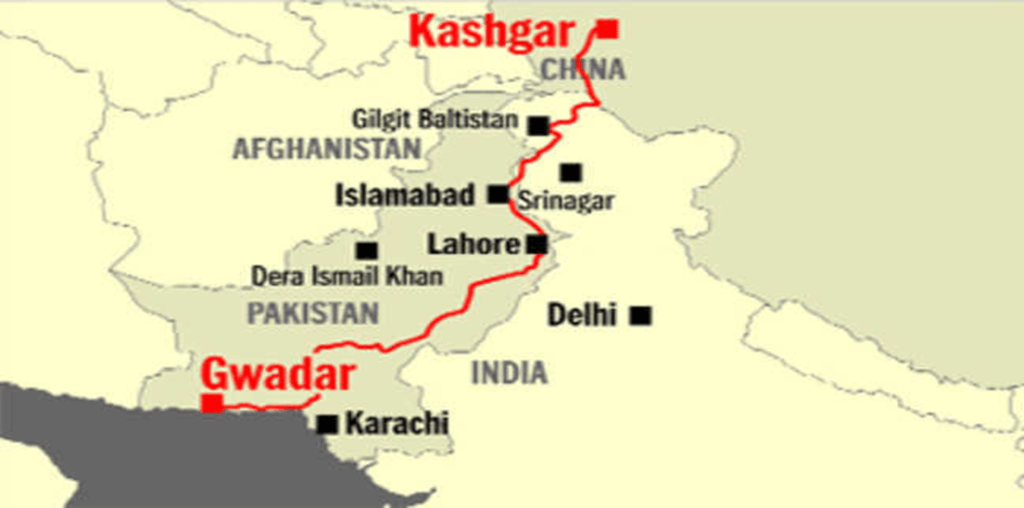Hindu Editorial Analysis : 10-May-2023
Recently, China and Pakistan made a significant decision to extend the China-Pakistan Economic Corridor (CPEC) to Afghanistan. This move, however, has faced opposition from India, mainly concerning issues of sovereignty and territorial integrity. The CPEC is a collection of infrastructure projects initiated in 2013 and is expected to be completed by 2049. It is part of China’s broader Belt and Road Initiative, aimed at enhancing trade and connectivity infrastructure between Central Asian, European, and South Asian markets.
Overview of the CPEC:
The CPEC encompasses a 3,000 km route comprising various infrastructure projects designed to establish a series of economic and trade hubs through road and rail networks. It aims to connect China’s western province of Xinjiang Uyghur Autonomous Region with Gwadar port in Pakistan’s Balochistan state. The original value of the CPEC projects was estimated at $47 billion, but it has now increased to $62 billion as of 2020.
Mutual Benefits for China and Pakistan:
For China, the CPEC provides an alternative route that bypasses the Strait of Malacca, a potential chokepoint during conflicts with the US or other adversaries. On the other hand, Pakistan sees the CPEC as a lifeline for its struggling economy. It expects the project to stimulate production, generate employment, and facilitate sustainable economic growth. The investment of billions of dollars in infrastructure projects through the CPEC is crucial for Pakistan, particularly as it faces sanctions and an economic crisis.
Challenges for the CPEC:
Laxity in project completion is a major challenge, with only three out of the 15 announced projects completed thus far. Moreover, critics raise concerns about Pakistan’s economic indicators, which may lead to difficulties in debt repayment, given the high interest rates associated with Chinese loans. China has also expressed concerns about the safety and security of its citizens working on CPEC projects in Pakistan, as incidents targeting Chinese citizens have raised alarm bells in Beijing.
India’s Concerns:
India objects to the CPEC due to its route through Pakistan-occupied Kashmir (PoK), a disputed territory between India and Pakistan. This violates India’s sovereignty, as established by international conventions that require consent from both parties for construction in disputed territories. Furthermore, India is concerned about the exploitation of natural resources, particularly the construction of two mega-dams on the Indus River by China, which could strain the Indus Water Basin.
India’s Security Concerns:
India is apprehensive about the strategic implications of China’s involvement in the region. Gwadar port’s association with the CPEC raises concerns about increased activities of the PLA Navy in the Indian Ocean Region (IOR). The potential for China to create obstacles to Indian trade and connectivity through the Strait of Hormuz poses risks to India’s energy security. Additionally, the revitalization of the Karakoram Highway grants Pakistan an advantage in mobilizing troops and military equipment to PoK, potentially destabilizing the region.

Suggestions for India:
To address these challenges, India should focus on maintaining communication and cordial relations with neighboring countries. Active participation in forums like the Shanghai Cooperation Organization allows India to engage with both Pakistan and China, fostering dialogue and understanding. India should also collaborate with international agencies like the Japan International Cooperation Agency (JICA) to offer soft loans and prevent developing countries from falling into the Chinese debt trap.
Furthermore, building alliances like the Quad will enable India to counterbalance China’s influence and maintain the balance of power in the Indo-Pacific region.
Why In News
Following a recent meeting in Islamabad, China and Pakistan have made a significant decision to extend the China-Pakistan Economic Corridor (CPEC) to Afghanistan, disregarding India’s objections regarding sovereignty and territorial integrity.
MCQs about The China-Pakistan Economic Corridor (CPEC)
-
Following a recent meeting in Islamabad, China & Pakistan agreed to extend the China-Pakistan Economic Corridor (CPEC) to Afghanistan. The move comes in spite of opposition from which country on issues of sovereignty and territorial integrity?
A. India
B. Iran
C. Russia
D. United States
-
Which initiative does the China-Pakistan Economic Corridor (CPEC) form a part of?
A. Belt and Road Initiative
B. Indo-Pacific Strategy
C. Shanghai Cooperation Organization
D. South Asian Association for Regional Cooperation
-
What are the main challenges faced by the China-Pakistan Economic Corridor (CPEC) project?
A. Completion delays and security concerns for Chinese citizens in Pakistan
B. Opposition from Central Asian countries and financial difficulties
C. Environmental concerns and territorial disputes with Afghanistan
D. Lack of support from international organizations and inadequate funding
-
Which suggestion is given in the essay to India regarding dealing with the China-Pakistan Economic Corridor (CPEC)?
A. Increase military presence in the Indian Ocean Region (IOR)
B. Seek international support to halt the CPEC project
C. Collaborate with Japan International Cooperation Agency (JICA) to counter China’s influence
D. Cut off all diplomatic ties with China and Pakistan
Boost up your confidence by appearing our Weekly Current Affairs Multiple Choice Questions
![]()


